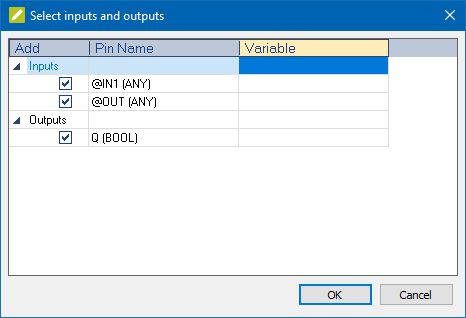Select inputs and outputs dialog
The dialog will be opened, when a selected function block has been moved to the desired position in the program.
To use this dialog, the following options have to be set active in Tools, Options... and Diagrams:
- Auto inserting variables when inserting a function block
- Display dialog to select inputs/outputs when inserting a function block

|
|
|
|
|
|
|
|
|
For ST Language: only inputs are available since you can only set inputs when calling a function block. For LD and FFLD Language: if the first input or the first output is EN/ENO, you cannot modify it (EN/ENO are mandatory for a rung connection). In ST, LD and FFLD Language:
|
|
|
|
Column |
Description |
|
|
Add |
Allows to select/deselect the corresponding variable via the checkbox. The variables are divided into:
|
|
|
Pin Name |
Describes the corresponding pin of the function block including its direction (IN or OUT) and its type. |
|
|
Variable |
Allows to select the variable name. A new name can be created too. In this case a dialog for the creation of a new variable is opened. If a constant IN input is entered, the syntax is fixed automatically. Example: time of 1s becomes a T#1s. It is not allowed to enter a constant for an output. If empty, the variable name is not set (empty), but it can be added if the corresponding checkbox in the column Add is checked. By default, if no changes are made, all variables are added, but without a name. |
|
Close dialog
|
Button |
Description |
|
OK |
Applies all changes in all tabs and closes the dialog. |
|
Cancel |
Discards all changes and closes the dialog. |
Select inputs and outputs dialog |
|
IEC 61131-3 Automation platform > IEC 61131-3 Programming Environment > Editing programs > Selecting function blocks > Select inputs and outputs dialog |
Created with the Personal Edition of HelpNDoc: Effortlessly Support Your Windows Applications with HelpNDoc's CHM Generation

